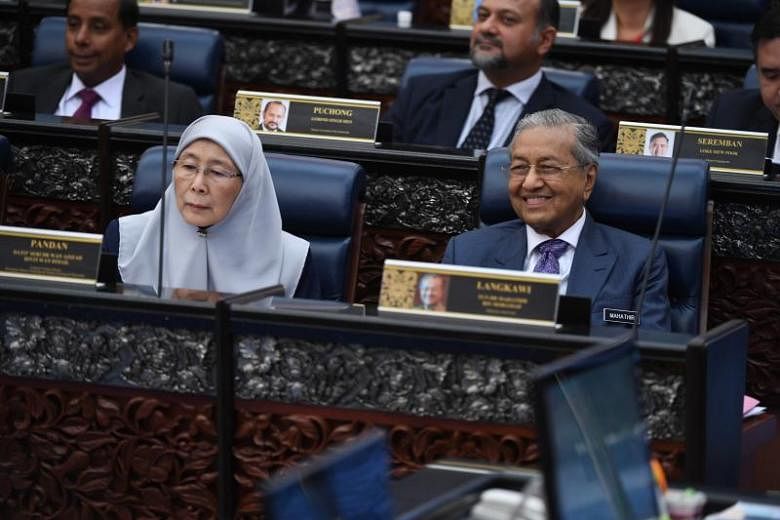KUALA LUMPUR (BLOOMBERG) - Faced with waning popularity and a flagging economy, Malaysia's ruling coalition government led by Prime Minister Mahathir Mohamad is balancing the need to tame rising debt and placating ethnic Malays demanding more government help.
Last Friday (Oct 11), Tun Dr Mahathir unveiled a budget that expanded the deficit target to 3.2 per cent of gross domestic product by introducing handouts and spending initiatives reminiscent of the days of former prime minister Najib Razak.
The federal Pakatan Harapan (PH) government debt sits at around RM800 billion (S$260 billion) for 2019, equal to 52.7 per cent of GDP, according to latest budget document.
The measures are an attempt to quell growing income inequality and poverty, issues Dr Mahathir's coalition pledged to tackle in the lead up to their surprise victory in general elections last year.
"I think they are now cognisant that if they want to get re-elected, they are going to have to prove that they have actually done something about that," said Mr Peter Mumford, consultancy Eurasia Group's South-east Asia practice head.
After pledging to unify the country by resolving longstanding racial divisions, PH said it would crack down on handouts popular with the previous administration that led to a US$238.5 billion (S$326.5 billion) government liability.
While revenue is weakening and the government is tightening its belt, Dr Mahathir's latest budget indicates some willingness to be flexible on fiscal restraint to appease a Malay community that accounts for half the population.
'NATIONALIST APPROACH'
"You do see this government maintaining a fairly Malay nationalist approach and I think that's the way they see this in terms of staying in power," said Mr Mumford. "The question is how does this Pakatan Harapan coalition stay together after Mahathir leaves" the government, which is expected to happen next year.
The proposed budget is just the latest push to reassure Malaysians of the government's commitment after the prime minister this month launched a 10-year national blueprint that promises to improve the standard of living for all Malaysians and rely less on foreign workers.
The government will spend within its means and won't add taxes just to fund certain infrastructure projects, Finance Minister Lim Guan Eng said in a Bloomberg Television interview with Haslinda Amin, after announcing the 2020 budget last Friday.
Still, nationalist factions have repeatedly chastised the coalition for not fulfilling reform promises, and local polls show PH losing support even while Dr Mahathir's popularity remains strong.
The recent alliance of two of Malaysia's biggest opposition parties Umno and Parti Islam SeMalaysia (PAS) last month could further politicise economic issues and pose a challenge to the ruling government in an election.
"Since our independence, the economic standing of the indigenous has become really alarming," said 58-year-old Malay activist Ibrahim Ali, who recently started up his own party, Putra.
"To me, the real issue is a fair distribution of the economy of the country. This is still the major problem, and if it is not solved then don't talk about the unity of all the races."
POVERTY CHALLENGE
In August, United Nations Special Rapporteur on extreme poverty Philip Alston challenged Malaysia's longstanding assertion that it had all but eradicated poverty over the decades, dropping from 49 per cent of the population in 1970 to just 0.4 per cent in 2016 - the lowest in the world. Instead, Mr Alston maintained the true rate in the country of 31 million is much closer to 20 per cent.
The World Bank last week forecast that Malaysia's economy would hold steady at 4.6 per cent through 2021 while it still remains susceptible to external shocks including the China-United States trade war and the global economic downturn.
PH officials say solving all of Malaysia's economic problems is not easy.
"The government is trying to do both, adjusting economic policies and at the same time minimising the effect on the masses - the poor - particularly in the rural areas, but it is not that easily achievable, given the current economic financial situation," said Mr Kadir Jasin, the prime minister's communications and media adviser. "The objective now is to instill confidence in the people and the business community."

